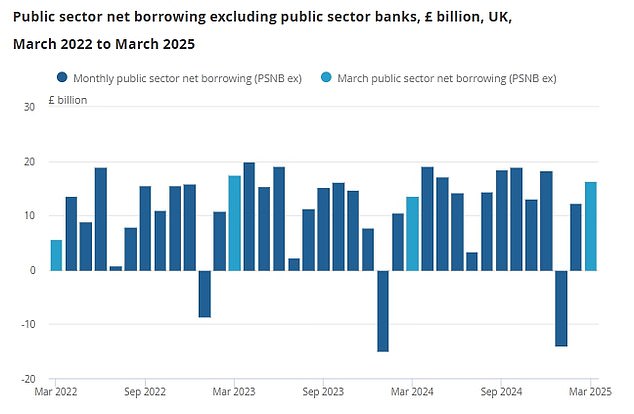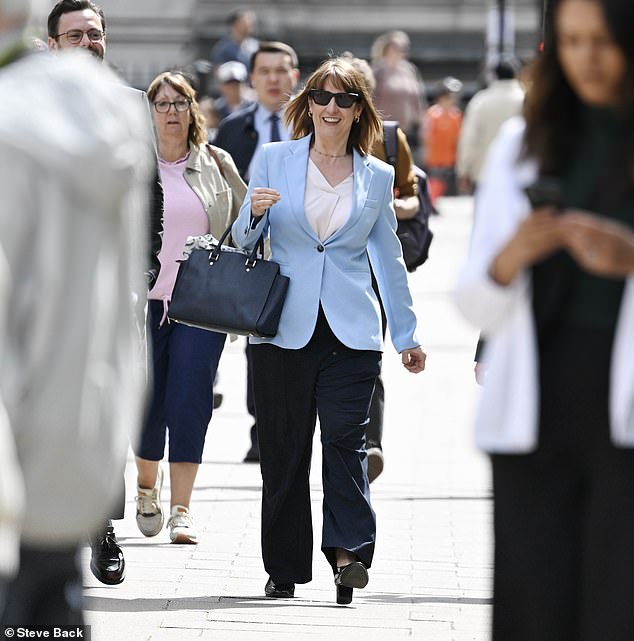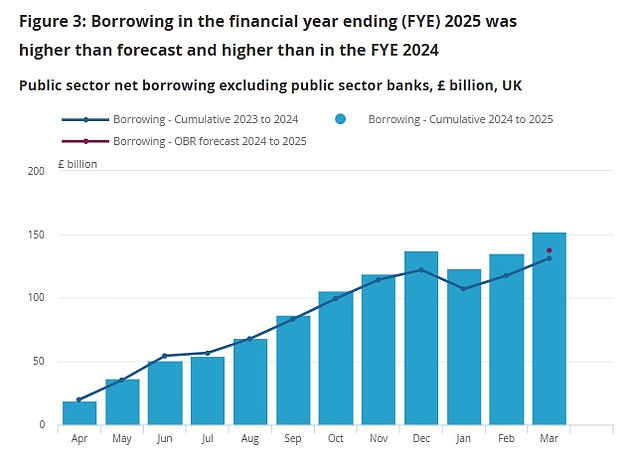Rachel Reeves is scrambling to strike a US trade deal to revive the economy on a trip to Washington today – as figures showed UK government borrowing spiking.
The Chancellor has vowed to ‘defend Britain’s interests’ as she prepares for talks with American counterpart Scott Bessant during the three-day IMF summit.
Intense negotiations have been taking place for an agreement that could exempt Britain from Donald Trump‘s eye-watering tariffs on imports. Hopes have dwindled that the ‘baseline’ 10 per cent levy can be eradicated, but the 25 per cent imposed on cars, aluminium and steel, as well as threatened charges on pharma, are thought to be on the table.
The grim backdrop to the discussions was underlined yesterday as the IMF dramatically downgraded global growth forecasts – reducing its predictions for UK plc from 1.6 per cent to 1.1 per cent this year and from 1.5 per cent to 1.4 per cent next year.
And data released this morning showed that public sector net borrowing rose to £151.9billion in the year to the end of March – with Labour’s bumper pay settlements for state workers partly blamed.

Public sector borrowing rose to £16.4billion last month, above the £15.8billion analysts had pencilled in

Chancellor Rachel Reeves (pictured in London yesterday) has vowed to ‘defend Britain’s interests’ as she prepares for talks with American counterpart Scott Bessant during the three-day IMF summit
That was £14.6billion higher than the £137.3billion forecast by the Treasury’s OBR watchdog – and the third highest level of borrowing in any financial year since records began in 1947. Only 2021 during the the Covid pandemic and 2010 amid the Credit Crunch were worse.
Borrowing rose to £16.4billion last month, above the £15.8billion analysts had pencilled in.
Economists warned that Ms Reeves almost certainly faces having to raise taxes or cut spending at the Budget this Autumn.
The respected IFS think-tank said the figures underlined the risk that Ms Reeves would not be able to meet her fiscal rules.
Elliott Jordan-Doak, senior UK economist at Pantheon Macroeconomics, said: ‘The public finances were already in a difficult position heading into the trade war, and we think both taxes and borrowing will need to be raised in the October Budget.’
Nick Ridpath, a Research Economist at the IFS, said: ‘The Chancellor’s fiscal rules which apply to forecast borrowing in 2029–30, are only being met by a hair’s breadth. Today’s data highlights the clear risk that is being taken with that strategy.’
Grant Fitzner, the ONS’s chief economist, said: ‘Our initial estimates suggest public sector borrowing rose almost £21billion in the financial year just ended as, despite a substantial boost in income, expenditure rose by more, largely due to inflation-related costs, including higher pay and benefit increases.
‘At the end of the financial year, debt remained close to the annual value of the output of the economy, at levels last seen in the early 1960s.’
Ahead of her visit to Washington, Ms Reeves said: ‘The world has changed and we are in a new era of global trade. I am in no doubt that the imposition of tariffs will have a profound impact on the global economy and the economy at home.
‘This changing world is unsettling for families who are worried about the cost of living and businesses concerned about what tariffs will means for them. But our task as a Government is not to be knocked off course or to take rash action which risks undermining people’s security.
‘Instead, we must rise to meet the moment and I will always act to defend British interests as part of our plan for change.
‘We need a world economy that provides stability and fairness for businesses wanting to invest, and trade, more trade and global partnerships between nations with shared interests, and security for working people who want to get on with their lives.’
Responding to the new IMF forecasts, she claimed ‘the UK is still the fastest-growing’ European country in the G7.

Data released this morning showed that public sector net borrowing rose to £151.9billion in the year to the end of March – with Labour’s bumper pay settlements for state workers partly blamed
‘The IMF have recognised that this Government is delivering reform which will drive up long-term growth in the UK, through our plan for change,’ she said.
‘The report also clearly shows that the world has changed, which is why I will be in Washington this week defending British interests and making the case for free and fair trade.’
As well as seeking to make progress on a US deal, Ms Reeves is also expected to discuss improving trading relations with other nations – something she has previously said the Government is keen to do.
Earlier in April, she hosted India’s finance minister for talks on a potential free trade agreement and trade is expected to feature heavily at a UK-EU summit in May.
Responding to the public sector finances figures, Chief Secretary to the Treasury Darren Jones said: ‘Economic stability is crucial within a changing world. We will never play fast and loose with the public finances, that’s why our fiscal rules are non-negotiable and why we are going through every penny of taxpayer money spent, line by line, for the first time in 17 years to tear out waste.
‘We are laser-focused on making sure taxpayer money is delivering our Plan for Change missions to put more money in people’s pockets, rebuild the NHS and strengthen our borders.’







